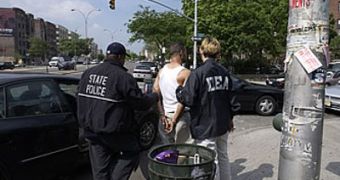Metamphetamine (crystal meth) is one of the most addictive drugs out there today, specifically engineered to offer long-lasting highs, and to cost less than heroin and cocaine. For a very long time, Mexico has been the largest supplier for the US market, but now crackdowns on cartels and tighter border controls forced the suppliers to unload their illicit cargos on local markets, turning most cities into battlegrounds for turf.
Some of the smaller towns in Mexico, which were safe for people a few years back, are now under siege, as gunmen paid by drug lords kill middlemen from rival cartels in broad daylight, and the innocent get caught in the crossfire. The gangs are also fighting the federal police and the army, as the government struggles to regain control at least in urban centers. So far, efforts in that direction have been met with brute force, and the situation doesn't seem to be getting better.
This year alone, 4,500 people were killed in cities throughout the country, in major, well-planned hits, which included grenade attacks, decapitations and drive-by shootings. The killings occur indiscriminately, at any time of the day and in any place. Not only hidden spots in ill-famed neighborhoods are home to such acts, but crowded streets in city centers as well, as gangs struggle to take each other out and gain dominance over the large markets.
Analysts say that the violence will only stop when one group overwhelms the others, and, even then, inhabitants in various urban centers could see even more violence, as the police and the military will most likely try to eliminate them as well. In the meantime, as middlemen are no longer paid cash for their "services," they are given crystal meth to unload. So they cook it and distribute it at schools, to children as young as 10, who end up either dead, or in rehabilitation centers.
The main problem with finding illegal operations is that the drug is easy to produce in homes, and many garages and bathrooms have been turned into real-life factories, which produce tons of the substance yearly. In old city centers, the labs are hidden in basements, and those who supply these "crack houses" make a fortune from importing the required chemicals.
At the moment, there is no end in sight for the current crisis, and, while federal authorities organize raids into their own cities as if they were invading another country – with armored vehicles and troops – more and more citizens become addicted to the drug, as dealers practically force them to take it, free at first, and then for ever-increasing sums of money.

 14 DAY TRIAL //
14 DAY TRIAL //